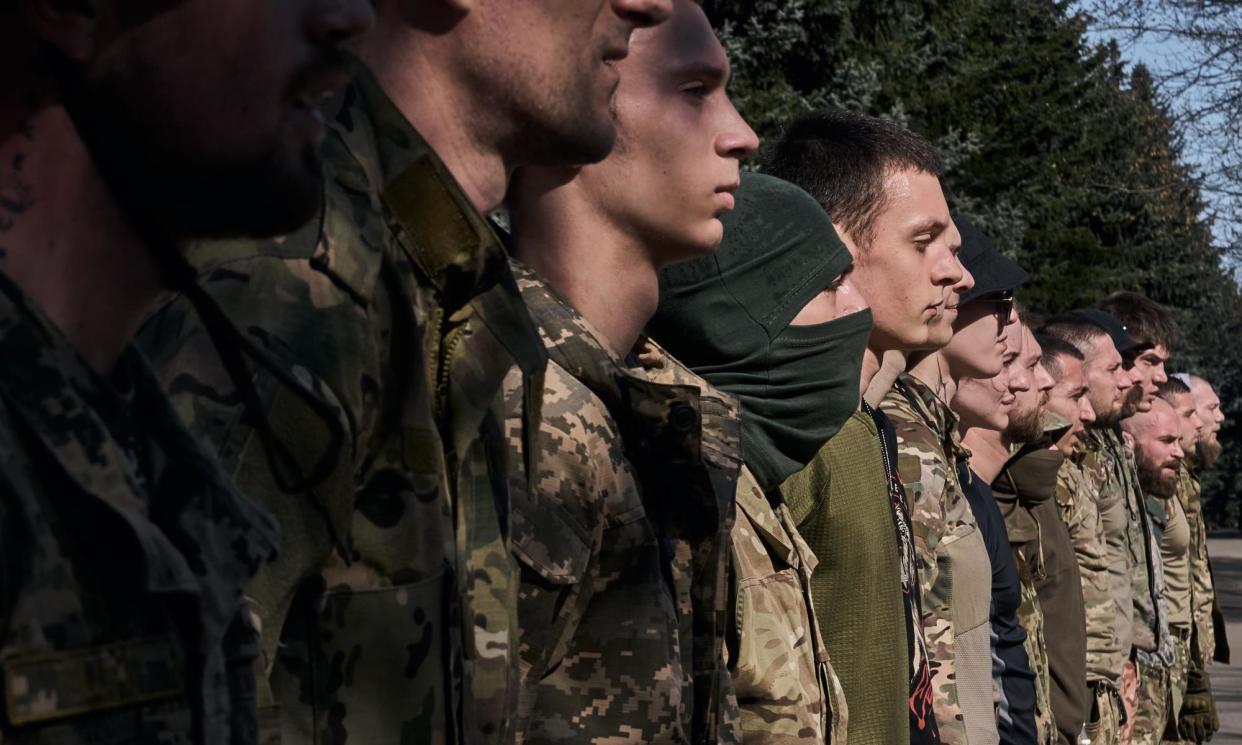Western military trainers could go to Ukraine, Lithuania minister says

Lithuania’s foreign minister has raised the prospect of an ad hoc coalition of western countries sending military training personnel into Ukraine backed by ground-based air defence, days after Russia took an increasingly strident tone against what it sees as the threat of deeper western involvement in the war.
Speaking to the Guardian after meeting his British counterpart, David Cameron, in London, Gabrielius Landsbergis also backed the British foreign secretary for saying that Ukraine could use British-made weapons against Russia; remarks that alongside Emmanuel Macron refusing to rule out western troops in Ukraine prompted the Kremlin to threaten UK assets and order a tactical nuclear training exercise.
Foreign secretary in Lithuania for four years, Landsbergis has long called for tougher action against Russia, but his latest remarks have shown that there is support in parts of Europe for the muscular line recently adopted by the French president.
Macron has shocked some European colleagues and infuriated Russia by saying the west should not rule out sending troops to Ukraine.
“Our troops have been training Ukrainians in Ukraine before the war, and we’ve been doing that for many years. So returning to this tradition might be quite doable,” Landsbergis said. “This could be a first step in president Macron’s initiative”.
He said a proposal to train Ukrainians inside their own country was “more practical” than the training taking place on the territory of Nato members.
“You don’t need to transport them all the way. You have everything that they need right there,” he said. “It could be that the trainers stationed as part of the coalition to train the Ukrainians in Ukraine could be defended with air defence, and that in turn implies that part of Ukrainian sky could be defended with air defence.”
He said the move would “tell Putin that it’s not up to him to decide the way that we’re helping Ukraine. Instead, we’ll see what is needed, and we adapt to the situation because the situation is not getting better.”
He said the Lithuanian parliament had already given the government a mandate to train inside Ukraine but that this would be best done as part of a bigger coalition.
Macron, facing widespread criticism, has stood his ground on the idea of sending troops to Ukraine, arguing that it is legitimate to keep Russia guessing about what the west is prepared to do to defend Ukrainian sovereignty. Strategic ambiguity unsettles Vladimir Putin, he has said.
Landsbergis said Macron’s remarks had already worked since the Kremlin had changed calculations.
He said nevertheless “there’s a lot of frustration” within Ukraine. “The Ukrainians are making it painfully clear, especially Dmytro Kuleba, the foreign minister, as to what Patriot batteries are needed and how they would be used. It’s impossible to make it any more clearer,” he said.
“The damage that we’re seeing – it’s on us, it’s our failure. It sounds like Russian success, but they can do this blindfolded if we’re unable to defend Ukrainian cities. They’re just bombarding the brain centres of the electricity grid which is way more difficult to fix.
“Looking into the next winter I honestly have a very difficult time to imagine how the country is going to fare.”
He said Europe’s recent leadership on Ukraine had been “a bit random”, adding that it took the Czech Republic, a relatively small country, to come up with an initiative to purchase ammunition en masse for Ukraine. “I would love to see some of the bigger countries taking the lead in questions like air defence, tank coalition, or whatever,” he said.
Landsbergis urged Britain to take a bigger role in Ukraine and denied that the country had taken too many steps away from Europe to make this possible. “There is room. There is a need. There is potential and there are things that we can do together.”
He highlighted a potential role for the UK in addressing the hybrid threat posed by Russia, something he described as a new reality but not part of conventional military warfare.
“There is the possibility of kinetic hybrid activity, meaning physical attacks, arson, violence against individuals,” he said, adding these assaults did not fall within the traditional definition of an attack to be addressed through Nato’s Article 5.
“What do you do when there’s a factory that is burned out or what do you do when there’s an attack that is clearly funded by Russia? How are these defined and addressed?” he asked. “In this, we need greater cooperation, and exchange of information between intelligence, but also between the politicians.”


